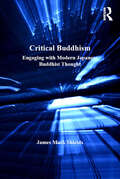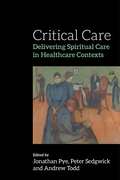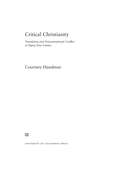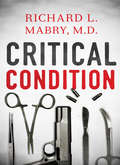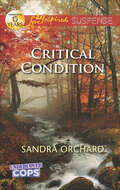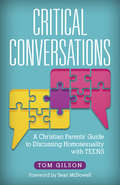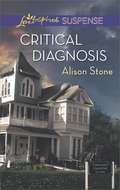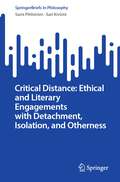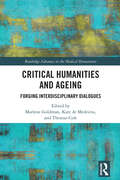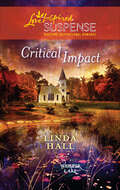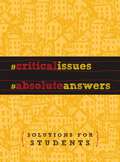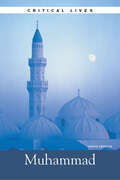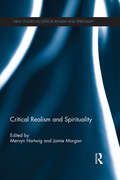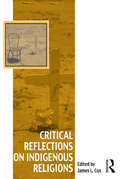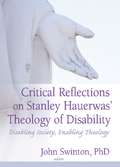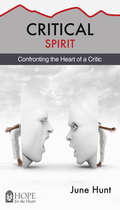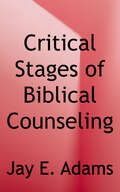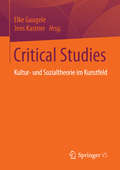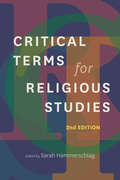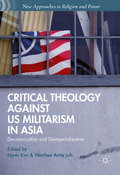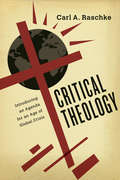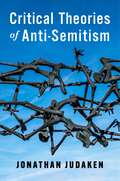- Table View
- List View
Critical Buddhism: Engaging with Modern Japanese Buddhist Thought (Routledge Critical Studies In Buddhism Ser.)
by James Mark ShieldsIn the late 1980s and early 1990s, the relative calm world of Japanese Buddhist scholarship was thrown into chaos with the publication of several works by Buddhist scholars Hakamaya Noriaki and Matsumoto Shiro, dedicated to the promotion of something they called Critical Buddhism (hihan bukkyo). In their quest to re-establish a "true" - rational, ethical and humanist - form of East Asian Buddhism, the Critical Buddhists undertook a radical deconstruction of historical and contemporary East Asian Buddhism, particularly Zen. While their controversial work has received some attention in English-language scholarship, this is the first book-length treatment of Critical Buddhism as both a philosophical and religious movement, where the lines between scholarship and practice blur. Providing a critical and constructive analysis of Critical Buddhism, particularly the epistemological categories of critica and topica, this book examines contemporary theories of knowledge and ethics in order to situate Critical Buddhism within modern Japanese and Buddhist thought as well as in relation to current trends in contemporary Western thought.
Critical Care (Mercy Hospital #1)
by Candace CalvertAFTER HER BROTHER DIES IN A TRAUMA ROOM, nurse Claire Avery can no longer face the ER. She's determined to make a fresh start—new hospital, new career in nursing education— move forward, no turning back. But her plans fall apart when she's called to offer stress counseling for medical staff after a heartbreaking day care center explosion. Worse, she's forced back to the ER, where she clashes with Logan Caldwell, a doctor who believes touchy-feely counseling is a waste of time. He demands his staff be as tough as he is. Yet he finds himself drawn to this nurse educator . . . who just might teach him the true meaning of healing.
Critical Care: Delivering Spiritual Care in Healthcare Contexts
by Debbie Hodge Peter Sedgwick Steve Nolan Jonathan Pye Julian Raffay Karen Mackinnon Layla Welford Charles Thody Hamish Ferguson-Stuart Stephen Flatt Anne Mccormick Rodney Baxendale Mirabai Galashan Mark Clayton Andrew Todd Richard WhartonProviding a bridge between research in healthcare and spirituality and practitioner perspectives, these essays on chaplaincy in healthcare continue dialogue around constructing, negotiating and researching spiritual care and discuss the critical issues in chaplaincy work, including assisted suicide and care in children's hospices. Each section of the book is introduced by an academic theologian, giving the book a strong theoretical base, before serving healthcare chaplains offer their perspectives and experiences with material drawn from practice in a broad spectrum of healthcare contexts. The integration of theory and practical application in these essays will be of interest to chaplains, healthcare practitioners, and students of theology and healthcare.
Critical Christianity: Translation and Denominational Conflict in Papua New Guinea
by Courtney HandmanIn Critical Christianity, Courtney Handman analyzes the complex and conflicting forms of sociality that Guhu-Samane Christians of rural Papua New Guinea privilege and celebrate as "the body of Christ. ” Within Guhu-Samane churches, processes of denominational schism-long relegated to the secular study of politics or identity-are moments of critique through which Christians constitute themselves and their social worlds. Far from being a practice of individualism, Protestantism offers local people ways to make social groups sacred units of critique. Bible translation, produced by members of the Summer Institute of Linguistics, is a crucial resource for these critical projects of religious formation. From early interaction with German Lutheran missionaries to engagements with the Summer Institute of Linguistics to the contemporary moment of conflict, Handman presents some of the many models of Christian sociality that are debated among Guhu-Samane Christians. Central to the study are Handman's rich analyses of the media through which this critical Christian sociality is practiced, including language, sound, bodily movement, and everyday objects. This original and thought-provoking book is essential reading for students and scholars of anthropology and religious studies.
Critical Condition
by Richard L. MabryIT WASSUPPOSED TO BE A QUIET DINNER PARTY WITH HER COLLEAGUES--NOT THESCENE OF A MURDER.But the murder of a stranger on herfront lawn is only the first in a string of events that have Dr. ShannonFrasier's life teetering on the edge of chaos. She's unable to make the deepercommitment her boyfriend deserves. Her sister shows up at her home needing aplace to stay but with no promise she'll remain sober. And her father isdiagnosed with cancer. Then Shannon's life stops teeteringand plunges into the abyss. Because the person behind the guttural voice on thephone wants to know what the stranger said before he died. And he won't stopuntil Shannon gives him the information he wants--even if she doesn't have it.He's coming for her. She's not surethe police on the case can be trusted. And her only hope of escape--for herselfand for those she loves--is to overcome her buried past.
Critical Condition (Undercover Cops #3)
by Sandra OrchardThere's a murderer in the hospital, and nurse Tara Peterson is determined to prove it. With mysterious deaths in the cancer ward, anyone could be next. But no one wants to believe her...except undercover agent Zach Davis. The murderer wants Tara's suspicions silenced, permanently. To protect Tara, Zach lets her in on his secret, and unwittingly into his heart. Tara and her three-year-old daughter are like the family he lost years before. Zach will risk everything to keep them safe, no matter the cost.
Critical Conversations: A Christian Parents' Guide to Discussing Homosexuality with Teens
by Tom GilsonChristian parents need to be prepared to answer the myriad challenges teens might hear in today's increasingly pro homosexual culture. "Why shouldn't gays get married?" "Who says gay sex is wrong?" "Does the Bible actually say there's anything wrong with homosexuality?" "Don't you care that kids are being bullied just for being themselves?"To start the discussion, Gilson provides a brief history of the issues beginning with the sexual revolution of the 1960s. He explains how and why cultural attitudes have reversed on this subject in such a short timespan, leaving Christians scrambling for answers.This is perhaps the most complicated and contentious issue Christians face in today's culture. Most churches are poorly equipped to handle it; parents are even less prepared. The good news is that parents need not have pat answers ready before they dive into conversations with their teens and preteens on this difficult topic. Learning together--parents struggling through these issues alongside their kids and leading them to biblical answers-- has relational benefits.Answers are important, though, so manageable, nontechnical answers to common questions surrounding this issue are provided, as well as a guide to further resources.
Critical Diagnosis
by Alison StoneHER PERSONAL PROTECTOR Researcher Dr. Lily McAllister has dedicated her life to finding a cure for a family disease and now, steps away from a promising new treatment, Lily is attacked. Only the training of army physician James O'Reilly can save her. As the would-be CEO of his family's pharmaceutical company, James's secret dream is to reenlist. But he can't leave Lily with a bull's-eye on her back. Nor can he stay and stop her from pursuing her goal. No one can, including the stalker who shadows her every move. Still, James has lost too many people he's loved-and this time he refuses to lose Lily.
Critical Distance: Ethical and Literary Engagements with Detachment, Isolation, and Otherness (SpringerBriefs in Philosophy)
by Sami Pihlström Sari KivistöThis book argues that no ethically appropriate relation to other human beings is possible unless we treat them as genuinely other. The authors provide reasons to be critical of various attempts, many of them popular in our contemporary (Western) culture, to encourage deeper attachment to and immersion into others’ lives and experiences. They defend the significance of the distance between human beings, criticizing exaggerated uses of, e.g., the concept of empathy and related concepts in academic as well as more popular ethical contexts, across a range of issues from the nature of ethical duty to the philosophy of love. The chapters offer non-technical philosophical and cultural criticism through selected perspectives on the continuum between closeness and distance, exploring various aspects of ethically significant relations between human beings. This book thus appeals to a wide audience, especially researchers and students in different fields of the humanities, including philosophy, literary studies, and cultural studies, by combining philosophical and literary methodologies in a humanistic examination of the value of distance. The book also argues that we have to be able to abstract from the concrete other in ethical relations, living in the normative and rational sphere of duty instead of emotional immersion.
Critical Humanities and Ageing: Forging Interdisciplinary Dialogues (Routledge Advances in the Medical Humanities)
by Marlene Goldman Kate De Medeiros Thomas ColeProviding a critical humanities approach to ageing, this book addresses new directions in age studies: the meaning and workings of "ageism" in the twenty-first century, the vexed relationship between age and disability studies, the meanings and experiences of "queer" aging; the fascinating, yet often elided work of age activists; and, finally, the challenges posed by AI and, more generally, transhumanism in the context of caring for an ageing population. Divided into four parts: Part I: What Does It Mean to Grow Old? Part II: Aging: Old Age and Disability Part III: Aging, Old Age, and Activism Part IV: Old Age and Humanistic Approaches to Care the volume provides an innovative, two-part structure that facilitates rather than merely encourages interdisciplinary collaboration across the humanities and social sciences. Each essay is thus followed by two short critical responses from disciplinary viewpoints that diverge from that of the essay’s author. Drawing on work from across the humanities - philosophy, fine arts, religion, and literature, this book will be a useful supplemental text for courses on age studies, sociology and gerontology at both undergraduate and graduate levels.
Critical Impact (Whisper Lake #3)
by Linda HallWhen a fatal explosion strikes smalltown Maine, a local officer and a beautiful suspect must find a devious killer in this romantic suspense novel.The bomb wasn’t supposed to be real. But the mock-disaster to test emergency procedures in Shawnigan, Maine, unleashed an explosion that left two people dead. And all evidence points to shy makeup artist Anna Barker as the prime suspect.When Deputy Sheriff Stu McCabe is assigned to investigate the case, Anna hopes he’ll prove her innocent. But with a harrowing past of his own, Stu is prone to suspicion. Somehow, they must learn to trust each other—and their faith—before the real killer decides to make critical impact . . . again.
Critical Issues. Absolute Answers.
by Thomas NelsonCompiled by youth leader Jay Strack, this book is a contemporary resource solidly based in Scripture that parents and youth leaders can use to answer the tough questions teens have about life. Today’s teens are coming of age in a broken, fallen world. The rise of technology has brought new problems that previous generations have never faced—problems that parents may have a hard time helping their teen through. Compiled by trusted youth leader Dr. Jay Strack, this book contains essays written by forty youth leaders and ministers across the nation on eighty topics that kids in their youth groups asked for guidance on. Each entry is solidly based in Scripture and answers questions that teens have on a variety of topics, such as: toxic relationships, cyber bullying, failure, depression, media influence, human trafficking, and more. A free 11-week facilitator’s guide is available online, making this an easy-to-use resource for youth leaders.Features & Benefits:Questions drawn from those actually asked by teensPerfect for personal use by teens or as a resource by parentsGreat purchase for ministries to use with youth groupsAnswers written by trusted, experienced youth ministers and compiled by Dr. Jay StrackFree 11-week facilitator’s guide easily transitions this book from personal use to small group use
Critical Lives: Muhammad
by Yahiya EmerickMuhammad was a religious visionary and political leader. Raised in the harsh Arabian Peninsula and orphaned while still a child, this unlikely leader and military genius received a calling to transform his society from a collection of raiding tribes into one of the world's most progressive societies. His message of monotheism and righteousness motivated an entire people to abandon idolatry and spread the word of God to surrounding nations. Although he was a military genius, his greatest accomplishments came from the religion he preached: Islam, which called its adherents to lead a life of prayer, charity, and contemplation. The second largest religion in the world, both Islam's prophet and its values are today often misunderstood by adherents and outsiders alike.This concise, informative biography explores: • Muhammad's background and boyhood, as well as the culture and society in which he lived • A look at Muhammad as a family man, and how his personal life was a testament to his high regard for women • Muhammad's mission as a prophet and his new religion's philosophy on topics ranging from monotheism to interfaith relations • The Qur'an and how it was revealed, how Muslims view it in their religious life, and the concept of Jihad from Muhammad's perspectiveThe Critical Lives series takes a biographical look at pivotal, fascinating people and a critical look at the work and accomplishments that, rightly or wrongly, made them unique, influential, and enduring. Discover the events that shaped their lives and how they came to shape our world.
Critical Perspectives on Empire: Imperial Russia’s Muslims
by Mustafa TunaImperial Russia's Muslims offers an exploration of social and cultural change among the Muslim communities of Central Eurasia from the late eighteenth century through to the outbreak of the First World War. Drawing from a wealth of Russian and Turkic sources, Mustafa Tuna surveys the roles of Islam, social networks, state interventions, infrastructural changes and the globalization of European modernity in transforming imperial Russia's oldest Muslim community: the Volga-Ural Muslims. Shifting between local, imperial and transregional frameworks, Tuna reveals how the Russian state sought to manage Muslim communities, the ways in which both the state and Muslim society were transformed by European modernity, and the extent to which the long nineteenth century either fused Russia's Muslims and the tsarist state or drew them apart. The book raises questions about imperial governance, diversity, minorities, and Islamic reform, and in doing so proposes a new theoretical model for the study of imperial situations.
Critical Perspectives on Empire: The Cultural Politics of Obeah
by Diana PatonAn innovative history of the politics and practice of the Caribbean spiritual healing techniques known as obeah and their place in everyday life in the region. Spanning two centuries, the book results from extensive research on the development and implementation of anti-obeah legislation. It includes analysis of hundreds of prosecutions for obeah, and an account of the complex and multiple political meanings of obeah in Caribbean societies. Diana Paton moves beyond attempts to define and describe what obeah was, instead showing the political imperatives that often drove interpretations and discussions of it. She shows that representations of obeah were entangled with key moments in Caribbean history, from eighteenth-century slave rebellions to the formation of new nations after independence. Obeah was at the same time a crucial symbol of the Caribbean's alleged lack of modernity, a site of fear and anxiety, and a thoroughly modern and transnational practice of healing itself.
Critical Realism and Spirituality (New Studies in Critical Realism and Spirituality (Routledge Critical Realism))
by Jamie Morgan Mervyn HartwigCritical Realism and Spirituality contextualizes, delineates, explores and critiques the turn to spirituality and religion in critical realism, which has been under way since the mid-1990s, as well as telling its story. It provides incisive discussion and anaysis of the following broad questions: How does critical realism allow and facilitate the resolution of problems in the area of comparative religion? Can it help you to justify your own faith or belief? What are the implications of the new philosophy of meta-Reality for traditional religious studies and how we organize and conduct our lives? A range of distinguished critical realists, theological critical realists and scholars working with related approaches (Roland Benedikter, Roy Bhaskar, Terry Eagleton, Mervyn Hartwig, Alister McGrath, Markus Molz, Jamie Morgan, Andrew Wright and others) bring their talents to bear on this task. While their personal beliefs span the whole spectrum from theism to atheism, they are united by the desire to open up a space for dialogue of one kind or another (intra-faith, inter-faith and/or extra-faith), promoting mutual understanding, respect and the unity and capability for collective emancipatory action on a global scale that humanity is so sorely in need of. This book is therefore, essential reading for students and academics alike in Religous Studies, Theology and Philosophy.
Critical Reflections on Indigenous Religions (Vitality of Indigenous Religions)
by James L. CoxThe study of indigenous religions has become an important academic field, particularly since the religious practices of indigenous peoples are being transformed by forces of globalization and transcontinental migration. This book will further our understanding of indigenous religions by first considering key methodological issues related to defining and contextualizing the religious practices of indigenous societies, both historically and in socio-cultural situations. Two further sections of the book analyse cases derived from European contexts, which are often overlooked in discussion of indigenous religions, and in two traditional areas of study: South America and Africa.
Critical Reflections on Stanley Hauerwas' Theology of Disability: Disabling Society, Enabling Theology
by John Swinton"No other mainstream theologian has so consistently and trenchantly taken a stand with and for people with developmental disabilities."-John SwintonCritical Reflections on Stanley Hauerwas&’ Theology of Disability: Disabling Society, Enabling Theology examines the influential writings of one of the most important contemporary theologians. Over the past thirty years, Time magazine Theologian of the Year (2001) Dr. Stanley Hauerwas has consistently presented a theological position which values the deep theological significance of people with developmental disabilities, as well as their importance to the life and the faithfulness of the church. Ten key Hauerwas essays on disability are brought together in a single volume-essays which reflect and illustrate his thinking on the theology of disability, along with responses to each essay from multidisciplinary authoritative sources including Jean Vanier, Michael Bérubé, John O'Brien and Ray S. Anderson.Dr. Hauerwas has always been a fearless voice in the field of theology. Critical Reflections on Stanley Hauerwas&’ Theology of Disability: Disabling Society, Enabling Theology presents his work on the true meaning of disability and provides critical multidisciplinary discussions about his challenging ideas and their validity. In his essays, Hauerwas discusses his views on issues such as the social construction of developmental disabilities, the experience of profound developmental disabilities in relation to liberal society, and the community as the "hermeneutic of the gospel." Included is a new essay by Dr. Hauerwas responding to the contributors to the book.Critical Reflections on Stanley Hauerwas&’ Theology of Disability: Disabling Society, Enabling Theology explores Hauerwas&’ thoughts on: the political nature of disability in liberal society the creation of a society where there is more love the dimensions of what is "normal" the key role of those treated as outsiders in building community the theological understanding of parenting which places responsibility for the individual child firmly within the Christian community using the model of the church as a social ethic developmental disability being equated with suffering the concept of the person in the theology of disability the developmentally disabled and the criteria for "humanhood" the importance of family in the process of caring for people with developmental disabilitiesCritical Reflections on Stanley Hauerwas&’ Theology of Disability: Disabling Society, Enabling Theology is a fascinating exploration of contemporary theological reflection on disability and is essential reading for students and teachers of practical theology, pastoral counselors, clergy, chaplains, and social and health care students.
Critical Spirit: Confronting the Heart of a Critic (Hope for the Heart)
by June HuntHarsh criticism—whether through hurtful words or disapproving gestures—can cause emotional pain, strain relationships, and stunt personal growth. In this 96-page book, June Hunt shows how to respond, heal, and stop the cycle of criticism with the healing balm of the Word of God. Is there someone in your life who has been critical of you? We have all been wounded by hurtful words of others − whether it's the constant nagging of a spouse, an overly critical friend, or a fault-finding parent. At the root of a critical spirit often lie insecurities and unmet needs. For many, critical attitudes are "caught" from a home life where parents modeled this destructive behavior. Whether you feel constantly beat up by the biting words of others or whether you are personally struggling with an overly critical attitude, find out how to respond to harsh criticism and how to cultivate a caring spirit with this easy-to-understand book by June Hunt. Discover how to—• Respond to harsh criticism• Confront someone with a critical spirit• Accept constructive criticism• Combat negative criticism with truth• Demonstrate a caring—not critical spirit—toward others Use this encouraging book as quick-reference or as a Bible study. Perfect for those who have been scared by the verbal criticism of others and for those who struggle with being overly critical. What is a Critical Spirit? How Can You Recognize It? June Hunt starts this minibook with a definitions section where she explains what a "critical spirit" is and its relationship to verbal and emotional abuse. She covers key characteristics, such as constant nagging, harsh judgment, unreasonable strict standards, excessive negative attitudes, and more. In this section, she explains: • How to identify whether you or someone you know has a critical spirit• 10 common characteristics of a critical person that often goes undetected Using the critical rebukes of Job's friends as models (Eliphaz, Bildad, and Zophar), June Hunt explains the 9 key differences between a caring and critical spirit. As you dig deeper into Job's story, you'll see common forms of criticism and find out how to know when a relationship is giving off unhealthy warning signs. What Causes Someone to Be Overly Critical? Why Are They So Mean? This minibook will shed light on what often causes people to develop a critical spirit. A critical spirit doesn't just appear out of nowhere—it is created and nurtured by past negative experiences. One of the most common causes of a critical spirit is growing up in a home where criticism was a constant, where parents modeled a critical spirit before their children. A critical spirit is often developed under the pressure of continual criticism—from unanticipated anger to unwarranted attacks. June Hunt shares not only what these causes are, but shares how to heal from these childhood wounds. How Should I Respond to Harsh Criticism? How Can I Stop Being Overly Critical? The last section titled "Steps to Solution" gives you practical advice on how to confront and cope with overly critical people. It also explains how to break the cycle of criticism by developing a caring spirit.Find out: • 8 steps to stop being overly critical• 8 ways to confront and cope with overly critical people• 9 keys to creating a caring heart• And much more!
Critical Stages of Biblical Counseling
by Jay E. AdamsGetting Started: The First Session of Biblical Counseling <p>What you do in the first session will set the tone for what follows--for good or for ill. It will help the counselee gain confidence in your ministry to him and--what is of greater importance--in the Word of God and the God of the Word. <p><p>Breaking Through: The Turning Point of Biblical Counseling <p>The turning point is crucial because true Christian change always involves a closer approximation of the thoughts and the life of the counselee to the thoughts and the ways of God as these are set forth in the Bible. <p><p>Finishing Well: The Termination of Biblical Counseling <p>This final book has to do with closing out a series of counseling sessions--how you know when to do so, how you do it, how you can make certain that you have done the right thing, and how you may follow up.
Critical Studies: Kultur- und Sozialtheorie im Kunstfeld
by Elke Gaugele Jens KastnerDer Einführungsband zu Kultur- und Sozialtheorien im Kunstfeld bildet den ,State of the Art' gegenwärtiger Kunstausbildung in seiner transdisziplinären und methodologischen Vielfalt ab. Die disziplinäre Palette reicht dabei von traditionsreichen Fächern wie Philosophie und Kunstgeschichte über Kultur- und Kunstsoziologie, Architektur- und Medientheorie, bis hin zu den Studies der Gegenwart: Queer Studies, Visual Studies, Transcultural Studies, Fashion Studies u. a. Darüber hinaus werden fächerübergreifende theoretische Ansätze und angewandte Praxisfelder vorgestellt.
Critical Terms for Religious Studies, Second Edition (Critical Terms)
by Sarah HammerschlagA new edition of a classic resource—composed of twenty-three essays written specifically for this volume. First published nearly thirty years ago, Critical Terms for Religious Studies proved a vital resource for an emerging interdisciplinary conversation. We still use much of the same language in the study of religion, but fresh concerns have both changed the meaning of terms and given rise to new terms altogether. This edition consists of twenty-three entirely new essays that offer students and scholars alike the tools to historicize and evaluate the shifting role of familiar and emerging critical terms in religious studies. These are “critical terms” both because they are important in our cultural moment and because thinking through them reveals how religions are embedded in and shaped by material, social, economic, and political forces. A shared conviction unites contributors from a range of traditions and methodologies: a recognition that our world is saturated by the persistence of religious traditions as shape-shifting (not static or transcendent) forces of authority, as powerful today as ever before.
Critical Theology against US Militarism in Asia: Decolonization and Deimperialization (New Approaches to Religion and Power)
by Nami Kim Wonhee Anne JohDrawing on cultural studies scholar Kuan-Hsing Chen's threefold notion of decolonization, deimperialization, and de-cold-war, this book provides analyses of the interrelated issues concerning the relationship between Christianity and the United States' imperialist militarism in the Asia Pacific. Contributors explore the effects of US imperialist militarism on the formation of Asian and Asian American collective subjectivity and inter/intra subjectivity. The book investigates the ways in which Christianity (broadly defined), in its own complexity, has been complicit in maintaining and reinforcing US imperialist military agendas in both national and international contexts. Conversely, the volume also discusses the various sites and instances where Christianity has managed to serve as a force of resistance against US imperialist militarism.
Critical Theology: Introducing an Agenda for an Age of Global Crisis
by Carl A. RaschkeCritical Theology
Critical Theories of Anti-Semitism (New Directions in Critical Theory #86)
by Jonathan JudakenDespite its persistence and viciousness, anti-Semitism remains undertheorized in comparison with other forms of racism and discrimination. How should anti-Semitism be defined? What are its underlying causes? Why do anti-Semites target Jews? In what ways has Judeophobia changed over time? What are the continuities and disconnects between medieval anti-Judaism and the Holocaust? How does criticism of the state of Israel relate to anti-Semitism? And how can social theory illuminate the upsurge in attacks on Jews today?Considering these questions and many more, this book is at once a philosophical reflection on key problems in the analysis of anti-Semitism and a history of its leading theories and theorists. Jonathan Judaken explores the methodological and conceptual issues that have vexed the study of Judeophobia and calls for a reconsideration of the definitions, categories, and narratives that underpin overarching explanations. He traces how a range of thinkers have wrestled with these challenges, examining the theories of Jean-Paul Sartre, the Frankfurt School, Hannah Arendt, and Jean-François Lyotard, alongside the works of sociologists Talcott Parsons and Zygmunt Bauman and historians Léon Poliakov and George Mosse. Judaken argues against claims about the uniqueness of Judeophobia, demonstrating how it is entangled with other racisms: Islamophobia, Negrophobia, and xenophobia. Critical Theories of Anti-Semitism not only urges readers to question how they think about Judeophobia but also draws them into conversation with a range of leading thinkers whose insights are sorely needed in this perilous moment.
